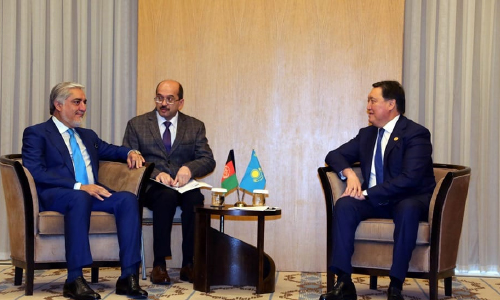TASHKENT - Chief Executive Abdullah Abdullah met with Tajikistan’s Prime Minister Kokhir Rasulzoda on the sideline of Shanghai Cooperation Organization’s Council of Heads of Government Summit in Uzbekistan.
The two sides discussed bilateral relations, trade, election, regional connectivity and the Afghan peace process, Abdullah’s office said in a statement.
“Tajikistan is a close ally and strategic partner to Afghanistan,” Abdullah said in a tweet.
Meanwhile, Abdullah met with Kazakhstan’s Prime Minister Askar Mamin, and First Vice President of Iran Ishaq Jahangiri in Tashkent, the capital of Uzbekistan.
Abdullah discussed the recent election of Afghanistan, peace, counter-terrorism, and bilateral ties with the two country’s leaders.
Abdullah on Friday arrived in Tashkent, the capital of Uzbekistan to attend the 18th Shanghai Cooperation Organization’s Council of Heads of Government Summit.
He was welcomed by Uzbekistan’s Deputy Prime Minister Aziz Abdul Hakimov, Uzbekistan’s deputy foreign minister Ilhom Nematov, Tashkent mayor Jahangir and Ahmad Khalid Elmi, Afghan Ambassador to Uzbekistan.
“I thank the brotherly Government & people of Uzbekistan for their warm welcome and hospitality,” Abdullah tweeted.
In this summit, heads of governments will exchange views on regional politics and security, economic cooperation, investments, counter-terrorism, and extremism.
The Shanghai Cooperation Organization SCO is an intergovernmental organization founded in Shanghai on 15 June 2001 by six countries China, Kazakhstan, Kyrgyzstan, Russia, Tajikistan, and Uzbekistan.
Currently, the SCO is comprised of eight countries India, Kazakhstan, China, Kyrgyzstan, Pakistan, Russia, Tajikistan, and Uzbekistan; and Afghanistan, Belarus, Iran, and Mongolia are the observer countries of the organization.
The main objectives of the SCO are to 1: strengthen relations among member states; 2: promote cooperation in political affairs, economics, and trade, scientific-technical, cultural, and educational spheres as well as in energy, transportation, tourism, and environmental protection; 3: safeguard regional peace, security, and stability; and 4: create a democratic, equitable international political and economic order. (ATN)
Home » Afghanistan » Abdullah in Uzbekistan to Attend SCO Summit
Abdullah in Uzbekistan to Attend SCO Summit

